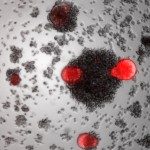Lien vers Pubmed [PMID] – 24606680
Virology 2014 Mar;452-453:32-41
The recent identification of a novel human coronavirus responsible of a SARS-like illness in the Middle-East a decade after the SARS pandemic, demonstrates that reemergence of a SARS-like coronavirus from an animal reservoir remains a credible threat. Because SARS is contracted by aerosolized contamination of the respiratory tract, a vaccine inducing mucosal long-term protection would be an asset to control new epidemics. To this aim, we generated live attenuated recombinant measles vaccine (MV) candidates expressing either the membrane-anchored SARS-CoV spike (S) protein or its secreted soluble ectodomain (Ssol). In mice susceptible to measles virus, recombinant MV expressing the anchored full-length S induced the highest titers of neutralizing antibodies and fully protected immunized animals from intranasal infectious challenge with SARS-CoV. As compared to immunization with adjuvanted recombinant Ssol protein, recombinant MV induced stronger and Th1-biased responses, a hallmark of live attenuated viruses and a highly desirable feature for an antiviral vaccine.

